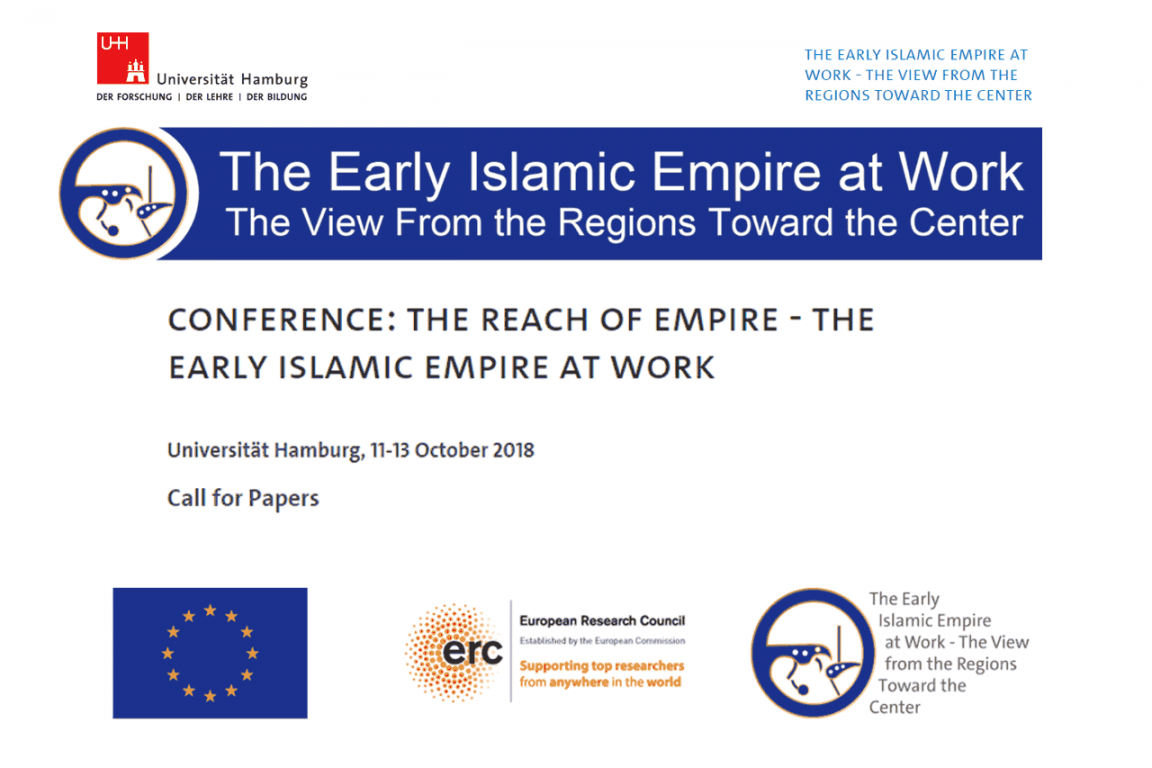The Reach of Empire – The Early Islamic Empire at Work

About The Event
Call for Papers
Date: October 11-13, 2018
Venue: Universität Hamburg, Hamburg, Germany
Abstract Submission Deadline: January 31, 2018
As the ERC project “The Early Islamic Empire at Work – The View from the Regions Toward the Center” nears its end, its final conference invites participants to consider the reach of the early Islamic Empire from the 7th to the 10th centuries CE.
When we talk about the reach of the early Islamic empire, we usually consider the geographical extent it encompassed, from the Hindukush to the Atlantic. However, the question of reach is a more intricate one that also entails the depth of military and administrative control over and within these vast regions. For instance, the geographical reach is closely related to the ways in which central and provincial authorities engaged communities on the territorial margins within each region. Imperial authorities did not exert the same level and type of influence over every community and place in the empire; forms of rule varied from the imperial cities to the frontier settlements, from the agricultural basins to the mountain areas, and from urban settlements to the steppes.
– What strategies did the empire employ to integrate peoples and elites of different provinces, ethnicities, and confessions within its administrative and bureaucratic structures?
– Which areas fell outside the central control of the empire, when did they do so, and why?
– How did the reach and type of control strategies employed by imperial authorities (d)evolve over time?
– To what extent, for example, did communities in the provinces seek integration in exchange for the potential benefits of empire?
– Alternatively, what motivated them to resist deeper integration?
– Should the wider process of regionalization that began in the 9th century CE be understood as successful provincial resistance, imperial failure, or simply an alternative form of negotiating empire?
The conference will also discuss the economic and fiscal reach of the early Islamic empire, which concerns its interest in fiscal extraction… The reach of empire also manifested itself in a range of integrating factors related to the provision of justice and the spread of Islam as an ‘imperial’ religion. How did the early Islamic Empire cultivate a legal system (or rather, systems) in light of the fact that the majority of the empire’s subjects remained non-Muslim during the 7th-10th centuries CE? How did the empire’s practice of dispersing justice operate alongside well-established Sasanian, Roman, Christian, Jewish, Zoroastrian and even Buddhist legal traditions? Throughout the early period, most of these legal systems flourished and formulated main corpora of their own doctrine, resulting in a rich tapestry and manifold forms of regional and local rulings.
We invite papers that consider the reach of law, Islamic and other, for the integration and functioning of the empire, as well as its role in the development of Islam as an ‘imperial’ religion. To what extent did ‘Islam’ serve as an integrating force, even if only for the imperial elite? How did the dimension of religion, conversion, and non-Muslim status relate to the reach of the empire, its various levels of integration, and the means by which integration was attained or resisted? The development of Islamic law in the late 8th and 9th century CE provided a crucial resource for regulating the empire’s workings. To what extent were the legal and religious dimensions of empire effective in extending its reach?
Abstracts should be 500-700 words in length. Please send them to katharina.mewes@uni-hamburg.de before 31 January 2018. Papers will be pre-circulated; presentations at the conference should summarize the speaker’s major points without exceeding 25 minutes. The presentations will be followed by 20 minutes of discussion.
A financial contribution to travel and accommodation costs for accepted papers might be possible, but cannot be guaranteed at this point.
Source: University of Hamburg


We're always eager to hear from you.
If you’d like to learn more about us or have a general comments and suggestions about the site, email us at